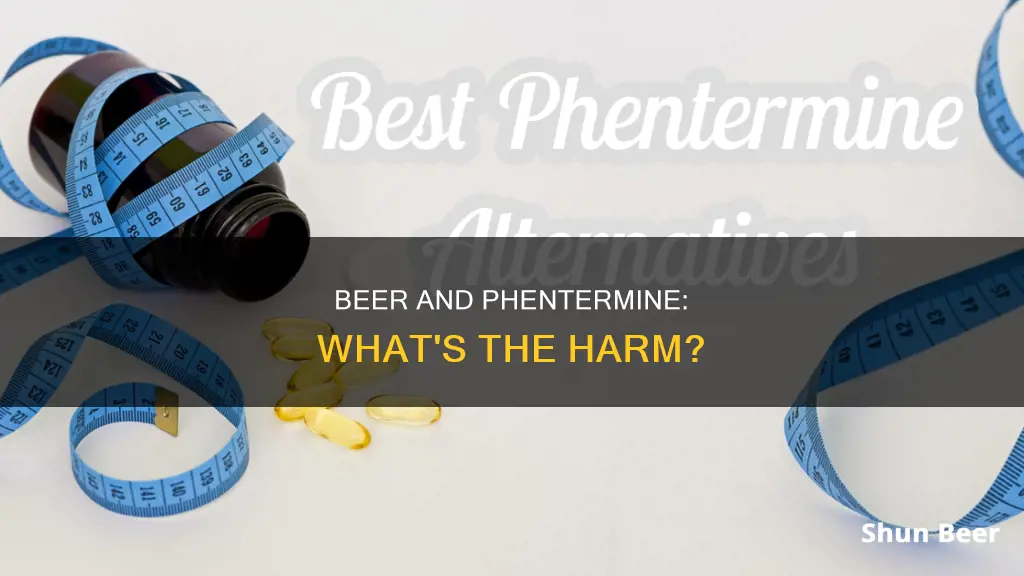
Phentermine is a prescription weight loss drug that is typically prescribed for short-term use. It is a stimulant that suppresses appetite and increases heart rate and blood pressure. Alcohol, on the other hand, is a depressant that affects the central nervous system. So, what happens when you mix the two?
The combination of phentermine and alcohol can lead to adverse effects and enhance the occurrence of side effects associated with both substances. This can result in feelings of extreme drowsiness, impaired judgment, and reduced coordination. The risk of experiencing heightened side effects, including cardiovascular issues, is also increased. As a result, mixing phentermine and alcohol is not recommended.
| Characteristics | Values |
|---|---|
| Combining phentermine and alcohol | Can increase the risk of cardiovascular side effects such as increased heart rate, chest pain, or blood pressure changes |
| Can increase the risk of nervous system side effects such as dizziness, drowsiness, depression, and difficulty concentrating | |
| May cause gastrointestinal issues | |
| May lead to alcohol use disorder | |
| May reduce the effectiveness of the medication | |
| May increase the risk of overdose | |
| May cause liver function and metabolism issues | |
| May increase the risk of psychological dependence |
What You'll Learn

Cardiovascular issues
Phentermine is a prescription weight loss drug that is typically prescribed for short-term use. It is believed to work by suppressing appetite and is usually taken as a 37.5 mg tablet or capsule once daily in the morning.
Phentermine is chemically similar to the stimulant drug amphetamine and is classified as a Schedule IV controlled substance with a small risk of abuse and dependence. It is contraindicated in patients with significant cardiovascular impairment, such as severe coronary disease, severe hypertension, cardiac structural abnormalities, and serious arrhythmias.
Mixing phentermine and alcohol can increase the risk of severe side effects, including cardiovascular issues. Alcohol can cause similar side effects to phentermine, and these could be amplified when combined with the drug. For example, both substances can increase blood pressure and put stress on the heart. Common side effects of mixing phentermine and alcohol may include:
- Increased heart rate
- Chest pain
- Nervous system side effects such as dizziness, drowsiness, depression, and difficulty concentrating
More severe side effects may include:
- Rapid heart rate (tachycardia)
- Heart attack
- Stroke
People with a history of heart disease, high blood pressure, or a history of substance abuse are particularly vulnerable to these severe side effects.
Mixing Beer and Tylenol: Is it Safe?
You may want to see also

Central nervous system problems
Phentermine is a prescription weight loss drug that is typically prescribed for short-term use. It is a central nervous system (CNS) stimulant that increases heart rate and blood pressure and decreases appetite. It is chemically similar to the stimulant drug amphetamine and falls under the class of drugs known as anorectics or anorexigenics.
When it comes to central nervous system problems, mixing phentermine and alcohol can increase the risk of severe side effects, including cardiovascular issues. Alcohol can cause side effects such as dizziness, drowsiness, depression, and difficulty concentrating. Combining it with phentermine can lead to enhanced and potentially dangerous side effects, including nervous system side effects such as dizziness, drowsiness, depression, and difficulty concentrating.
The combination of alcohol and phentermine can also increase the risk of cardiovascular side effects, including an increased heart rate, chest pain, or blood pressure changes. These side effects can be life-threatening and are particularly dangerous for people with a history of heart disease, an overactive thyroid (hyperthyroidism), glaucoma, agitation, or a history of substance abuse.
Additionally, phentermine may impair judgment and affect a person's ability to drive or operate machinery. It may also interact with other central nervous system stimulants, leading to potentially fatal consequences. Therefore, it is recommended to avoid alcohol entirely while taking phentermine to minimize the risk of central nervous system problems and other adverse reactions.
Pensacola Beach's Beer Laws: Drinking Scenarios Explained
You may want to see also

Side effects
Phentermine is a prescription weight loss medication that is often recommended to people whose obesity is affecting their health. It is meant to be taken in conjunction with a healthy diet and exercise. However, it is designed for short-term use only and should be taken under the guidance of a healthcare provider.
Cardiovascular Problems
Phentermine is a stimulant that increases heart rate and blood pressure. Alcohol can also impact cardiovascular health. When combined, there is an increased risk of cardiovascular complications such as elevated heart rate, high blood pressure, chest pain, and potential strain on the cardiovascular system. This can further elevate the risk of heart attack or stroke in those with heart disease or obesity.
Central Nervous System (CNS) Problems
Both phentermine and alcohol can produce similar effects on the central nervous system, such as dizziness, drowsiness, and difficulty concentrating. When combined, these effects may be enhanced, resulting in extreme drowsiness, impaired judgment, and reduced coordination.
Gastrointestinal Issues
Alcohol irritates the lining of the stomach, and when combined with phentermine, it can bring on gastrointestinal problems.
Psychological Effects
Phentermine can cause psychological effects such as a false sense of well-being, and in some cases, it may lead to mental illnesses or dependence. Alcohol is a depressant that affects the central nervous system. Combining the two substances may increase the risk of developing psychological dependence on either of them.
Liver Function and Metabolism
Both phentermine and alcohol are metabolized by the liver. Consuming them together may put additional strain on the liver and potentially impact its function, leading to potential negative effects on liver health.
Memory Loss and Impaired Recall
Alcohol consumption can affect memory and cognitive functioning. Mixing phentermine with alcohol can potentially increase the risk of memory loss and impaired recall, interfering with daily activities and having long-term consequences on cognitive abilities.
It is important to consult a healthcare provider before consuming alcohol while taking phentermine to assess any potential risks and receive personalized advice.
Mixing Mucinex and Beer: Is It Safe?
You may want to see also

Liver function and metabolism
Phentermine is a prescription weight loss medication that is often recommended to people with obesity-related health issues. It is a stimulant that suppresses appetite and is meant to be used in conjunction with a healthy diet and exercise. However, it is only intended for short-term use and should be taken under the guidance of a healthcare provider.
On the other hand, alcohol is a depressant that affects the central nervous system. It slows down communication between nerve cells in the brain, and its effects can vary depending on the amount consumed, the rate of consumption, and an individual's tolerance.
When it comes to liver function and metabolism, both phentermine and alcohol are metabolized by the liver. This means that combining these substances may put extra strain on the liver and potentially impact its function. The liver is responsible for metabolizing medications and removing toxins from the body. When burdened with processing alcohol and phentermine at the same time, the liver may not function optimally, leading to potential negative effects on liver health.
As a result, mixing phentermine and alcohol can have adverse effects and compromise the intended purpose of the medication. The combination of these substances can enhance the occurrence of side effects, such as dizziness, drowsiness, and difficulty concentrating. Additionally, there is an increased risk of cardiovascular complications, including elevated heart rate and blood pressure.
To ensure optimal treatment with phentermine, it is generally recommended to avoid alcohol consumption altogether. This helps minimize the risk of adverse side effects and interactions between the two substances. Prioritizing liver health and following the guidance of a healthcare provider are crucial when considering the use of phentermine and alcohol simultaneously.
Beer and Pap Smears: What You Need to Know
You may want to see also

Psychological dependence
Phentermine is a prescription weight-loss drug that is chemically similar to the stimulant drug amphetamine. It is classified as a Schedule IV controlled substance with a small risk of abuse and dependence. While phentermine can be habit-forming, studies have shown that psychological dependence on phentermine is not common among patients.
A study by Hendricks et al. (2014) investigated the addiction potential of phentermine in 269 obese, overweight, or formerly obese patients treated with the drug long-term. The study used several assessment tools, including the Severity of Dependence Scale (SDS), to evaluate the risk of psychological dependence. The results showed that all long-term patients had low SDS scores, indicating a lack of psychological dependence on phentermine. This finding suggests that phentermine does not lead to strong cravings or compulsive use, which are characteristic of substance use disorders.
Additionally, case reports and studies have indicated that phentermine may have the potential to induce or aggravate depression in some patients. However, the evidence is mixed, and further research is needed to clarify this relationship. It is important to note that individuals with a history of psychiatric illness or substance use disorders may be more vulnerable to the psychological effects of phentermine.
In summary, while phentermine has a small risk of abuse and dependence, studies suggest that psychological dependence is not a common outcome among patients taking this medication. However, it is crucial to carefully monitor individuals taking phentermine, especially those with a history of mental health or substance use disorders, to identify any signs of psychological dependence or adverse effects on mood.
Beer and High Cholesterol: Is It Safe to Drink?
You may want to see also
Frequently asked questions
No, it is not recommended to drink alcohol while taking phentermine. Mixing the two can increase the risk of severe side effects, including cardiovascular issues, liver problems, and central nervous system problems.
The combination of phentermine and alcohol can lead to various side effects, including dizziness, drowsiness, impaired coordination, difficulty concentrating, and increased heart rate and blood pressure.
Phentermine is a stimulant that suppresses appetite, while alcohol is a depressant that affects the central nervous system. When combined, the side effects of both substances are enhanced, leading to unpredictable reactions and dangerous situations.
If you are considering consuming alcohol while taking phentermine, it is crucial to consult your healthcare provider first. They can assess the potential risks and provide personalized guidance based on your individual circumstances.







